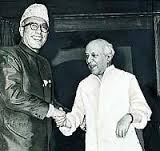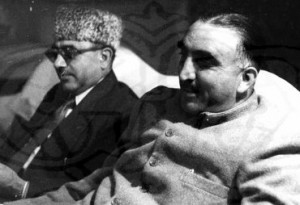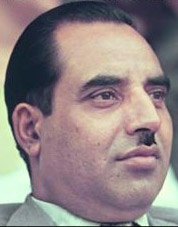Peace Watch » Kashmir-Talk » Next Role-Player in Jammu and Kashmir?
Next Role-Player in Jammu and Kashmir?
From the trashcan of politics
Z.G. MUHAMMAD
For understanding contemporary Kashmir politics, sometimes it is rewarding to stir through trashcan of history. No moment one stirs through it, some nauseating stories come to the surface that one finds are being replicated even today.  The other day glancing through the broadsheets and reading about eagerness of some “electoral-politicians” signing ‘Faustian-contracts’ for strutting across the corridors of power for some time- a line from ‘As You Like It’ less read Shakespearean drama, repeatedly resounded in my mind: “Let it suffice thee that I trust thee not”.
The other day glancing through the broadsheets and reading about eagerness of some “electoral-politicians” signing ‘Faustian-contracts’ for strutting across the corridors of power for some time- a line from ‘As You Like It’ less read Shakespearean drama, repeatedly resounded in my mind: “Let it suffice thee that I trust thee not”.
Seen in historical perspective the quoted line could be an appropriate title for history of sixty seven years relations between New Delhi and Kashmir “electoral- politicians”. With New Delhi, any politicians has been or is okay, so far he wags … at the command – refusing amounts to defiance and defiance calls for sending into wilderness, even to dungeon. Sending of one ‘politician’ into dungeon is celebrated with fireworks by the second one. Tumbling down of the second one from the ladder of power is observed as the D-day by the third. This phenomenon – or particular brand of New Delhi- Kashmir politics could be best explained by starting with retelling the story of Pandit Ram Chand Kak, Prime Minister of Maharaja of Kashmir at an important juncture of the history of the Sub-Continent- when India and Pakistan two new dominions were joining comity of independent nations.
For about a year the Congress leadership, was working overtime to ensure Jammu and Kashmir becoming part of India. Jawaharlal Nehru used all means to convince Lord Mountbatten about ‘essentiality’ of bringing the State within ‘fold of India’. In third week of June 1947, when Mountbatten left for Srinagar for meeting the Maharaja, he had a longish note prepared by Nehru in his hand. This note in fact was the last Viceroy’s bible for dealing with Kashmir. In his note brimming with personal biases and prejudices Nehru had portraying Kak as a bête noire and had suggested his removal important for ‘achieving the goal’. Mountbatten failed to pin down the Maharaja for any serious discussion on future of Kashmir. Failure of his mission convinced him that Prime Minister Kak is the person who had seeded idea of ‘independence’ ’ in Hari Singh’s mind- and with he being around the state cannot be made to join India. Services of Gandhi and Sardar Patel even Golwalker were utilized to make the Maharaja to remove Pandit Kak from the coveted position and placed under house arrest. Interestingly, the National Conference cadres celebrated with gusto removal of Kak and installation Maj Gen. Thakur Jank Singh in his place. The party illuminated the city at night. Took out procession, sang songs praising the Maharaja and sent adulatory telegram to Hari Singh- their bête noire till yesterday. On the recommendations of Home Minister, Sheikh Abdullah was released and few days after landing of Indian army he was appointed first as chief administrator then as Prime Minister. Till New Delhi believe his voice was in sync with its discourse he swaggered across the streets of the state like a monarch. Irony of history is that barely after six years, he was dismissed like Pandit Kak to be replaced by his man Friday Bakshi for twenty two years. Sending him to prison was celebrated with much more passion and passion at Nehru’s House and Mujahid Manzil- NC headquarters than was at the dismissal of Kak at the Palace. O. M. Mathai, Nehru’s Secretary provides us insiders account about jubilation at Nehru House. Nehru’s son-in-laws’ comment on Abdullah’s arrest tells a whole story: “Bakshi did a foolish thing in arresting Sheikh Abdullah –he should have taken him to the top of a lonely hill on border and pushed down and shot him.” 
A decade later history repeated itself. Bakshi also met his political nemesis- he was humbled by Sadiq- another party man- his partner in concocting the “Lahore Story” that had devastating impact on Kashmir politics. That immensely contributed to perpetuation of uncertainty in the region and agony of people. New Delhi politics of “use and throw” did not end there only. Syed Mir Qasim has beautifully summed it up in his autobiography. Stating, that he and Sadiq were recognized as proverbial Jonathan and David in Kashmir politics but New Delhi used its old machinations ‘in making us political rivals and enemies.’ He writes, “Whenever New Delhi feels a leader in Kashmir is getting too big to his shoes, it employees Machiavellian method to cut him to size. This it does by projecting a lesser leader as an alternative with the help of a two-way overt or covert campaign”. ‘Convinces the lesser leader that earlier leaders have outlived their utility and had lost their popularity.’
After the 1977 elections yet another dimension was added to this strategy. Some leaders were told not to look towards the “All India Parties” instead launch parties with parochial agenda-even with “soft-separatism” to shrink space for the ‘popular narrative. In the post-1990 scenario, when best minds in the capital engaged in Kashmir saw no light across the tunnel this strategy became New Delhi’s new doctrine for dealing with the Kashmir situation. Some incarcerated leaders were also approached with formulas and plans- something similar to one later announced by Prime Minister, Narasimha Rao, in November 1995 at Burkina Faso. And at the same time Rao was talking to the National Conference leaders on similar lines asking them for participating in the elections. It is another subject, if the N.C. leadership failed to see Burkina Faso offer translated into reality or New Delhi again reneged. However, the policy of propping up regional parties with ‘softer-separatism’ continued to be an important pillar of New Delhi’s Kashmir doctrine – with counter checks by alliance partner for about eighteen years.
The question arises, well New Delhi continue with this policy or it is contemplating to revive its old Machiavellian politics of dumping old hands professing “softer-separatism” politics and co-opting another group of small-time politicians…to be dumped after doing the needful.
first published in Greater Kashmir on 10-11-14
Filed under: Kashmir-Talk








Well this is not a policy of New-Delhi exclusively with Kashmir.All Central Top leaders of all political parties have been playing the same game with the Regional/state Sataraps! I need not give examples.Start from your neighbouring state of Punjab with Akalis and then go on travelling south,you will see the scenario being repeated ad-nauseam !